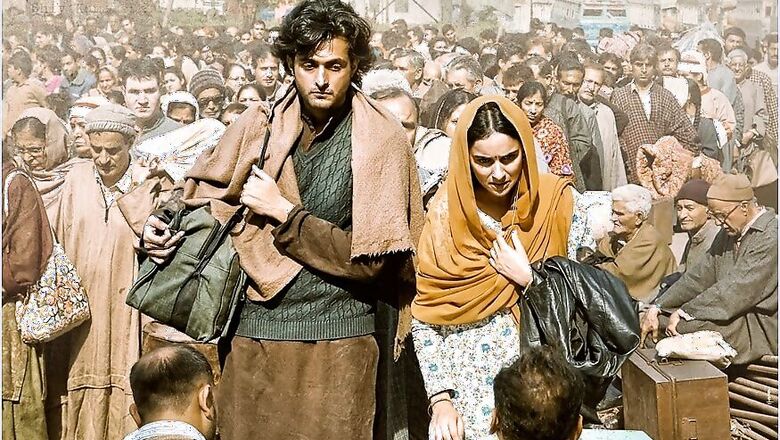
views
I have been watching interviews of filmmaker Vidhu Vinod Chopra on various TV channels lately. Experienced in giving interviews, Chopra has become nuanced and makes me question if his upcoming film, Shikara, would truly represent f the plight of Kashmiri Pandits. When confronted with the serious issue of how can one deal with tormentors, he gets exposed completely. He seems to suggest that people should say “sorry and move on”.
It is not that easy. May be Chopra wanted to create a movie that would not hurt sensitivities and try to be more inclusive. I have not seen the movie. But having watched him speak, I only wonder if the film is an extension of his ideology as that would be a disaster.
He claimed he does not read newspapers or watch television for news as he is unhappy with news about violence that comes on a daily basis. One wonders if such a person can reflect truly on society. He said he supported the CAA but changed his stand after the widespread protests. He suggested ‘samvad’ (dialogue) to be the way to resolve the crisis. One would be aghast at his failure to see politics behind such protests when TV channels have come out with exposé on these protests. An Act that has been implemented after thorough discussion in Parliament and various speeches of BJP leaders that focused on the issue cannot be said to be lacking ‘samvad’.
Chopra took 11 years to make Shikara because he wanted to be objective and not be prejudiced by his own sufferings. Can he then be expected to do justice to the emotions that have shaped the anger of Kashmiri Pandits? Justice would be to present the dreamland that Kashmir was, the radicalisation that made it the land of jihad, genocide of Kashmiri Pandits and the exodus and the resulting anger. The genocide that killed thousands of Pandits resulting in exodus of lakhs must be captured as it was for generations to know what actually happened.
After hearing Chopra’s views, one would conclude that the approach to film would be to present Kashmiri Pandits as magnanimous and large-hearted, keen to forget the genocide and Kashmiri Muslims as repentant of their acts and ready to welcome Pandits back home. “Say sorry and move on,” he says.
This is childish and too simplistic an understanding of the situation that prevailed. This is the same as Indira Jaisingh telling 2012 Delhi gang-rape victim’s mother to forget those convicted of the crime. She got a mouthful from the mother and Pandits are likely to do the same after watching the movie, if this thought prevails in the film.
You cannot show weakness as strength to push forward the cause of inclusiveness. In the film, a mother visiting her ancestral house and hugging her Muslim counterpart and weeping is not necessarily a sign of inclusiveness. It is more of a complaint, an emotional outburst that is trying to question, ‘why did you not prevent us from fleeing?’ It is also a veiled anticipation that one would be accepted back.
If a theory of inclusion and ‘samvad’ was accepted as the norm, one would never have fought against the perpetrators of injustice. In 1940, Uddam Singh killed Michael o' Dwyer in London, who was responsible for Jallianwala bagh massacre of 1919. Injustice by tormentors and ways to seek justice have always been the theme of revolutionaries who fought for India’s independence. One must never forget history in order to prevent its repeat.
It has become fashionable for Mumbai filmmakers to twist history in order to appear to be secular or more inclusive. At times the film becomes an apology. People will not appreciate if isolated incidents during exodus are generalised to present Kashmiri Muslims as liberal and victim of the same terrorism, and the recorded incidents of mass exodus are not presented the way they were. We should not underestimate the viewers. They are mature and know the history well.
In some cases, it is the neighbours who told militants where Pandits were hiding so that they could be killed. They knew the design quite well because threats were being issued on loudspeakers atop mosques, asking Pandits to either leave, get converted or killed.
Kashmiriyat existed because converted Muslims respected their origin and were far away from radical Islam. After thousands of temples were destroyed, homes of Hindus were burnt and Pandits forced to live in exile in their own country, one should not expect that suddenly Kashmiriyat would be back and everything would be normal. It will take readjustment, and perhaps a few more generations after Pandits have settled back in their original homes.
It does not matter if you don't like your neighbour till he is not empowered to threaten your existence. Gradually, it should lead new equations based on the reality that Pandits are again an integral part of Kashmiri society and you cannot wish them away.
The other faster way for assimilation is, Muslims in the Valley should come forward and start reconstructing those temples and give back to Pandits their original homes as a gesture of goodwill. We will wait to watch what Chopra has suggested in his film. Merely hugging and weeping and going back to realise the glorious past would not give any solution. Saying Sorry is not Enough: What must prevail is Justice. Whether the film will produce catharsis on culprits also remains to be seen.
The author is national spokesperson and in-charge for media relations of the BJP. Views expressed are personal.




















Comments
0 comment